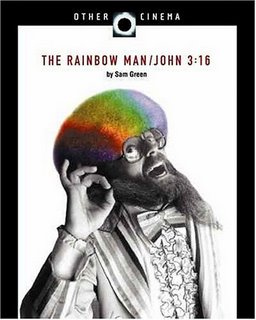
John 3:1-16 must be one of the most well-known passages in all of Scripture. This chapter is often thought of as "the born-again chapter". From the standpoint of popular American chapter, chapter 3 is the Jimmy Carter chapter, and John 3:16 is the Superbowl verse (a.k.a. the rainbow head guy verse). The danger with cursory familiarity is to miss the significance of what is actually being proclaimed.
The Apostle John, Jesus' best friend, was a great writer. There are several profound thoughts that he offers to us in this chapter.
A first profound thought John offers is that the gospel is all about the kingdom of God. In response to Nicodemus's opening question Jesus says, "No one can see the kingdom of God unless he is born again." Note that the ultimate concern here is not being born again: it is seeing the kingdom of God. Being born again is the means to the end but not the end in itself. Being born again is the necessary entry into the kingdom, but the implications of the kingdom then extend far and wide in every direction. What then is the kingdom of God? God's rule in God's place. This is what the people of God are to be bringing into reality in our places of employment, in our homes, and in our friendships.
A second profound thought John offers is that entering the kingdom of God starts with spiritual regeneration. This spiritual regeneration is nothing less than spiritual rebirth affected by the Spirit of God coming into our very souls. Ever since Eve at the apple in the garden of Eden, and Adam joined her, human beings have been born degenerate. The only hope we've had is an act of God, which is what would soon happen at Pentecost after Jesus' crucifixion. The Spirit would come and take up residence in the hearts of those who called out for mercy and help. This same Spirit comes today upon anyone willing to say, "Lord Jesus, have mercy on me, a sinner."
A third profound thought John offers is that living out the kingdom of God involves a very public commitment. As a writer, John was a lover of subtelty. In this case, note when Nicodemus came to Jesus - at night (v. 2). Jesus picks up on the theme of light and darkness later in this interaction in v. 19: "Light has come into the world, but men loved darkness instead of light because their deeds were evil." Nicodemus came to Jesus at night, but would he acknowledge Jesus in the broad light of day? Fast forward to just after Jesus' crucifixion. Joseph of Arimathea asks for the body of Jesus (John 19:38), and who was with him? None other than Nicodemus, "the man who earlier had visited Jesus at night." Not only did Nicodemus step up to acknowledge Jesus in public, but he brought with him 75 pounds of spices. As a member of the Jewish ruling council, this could not have won Nicodemus any points at the Pharisees' country club. The implicit challenge to us is this: are we willing to make a public commitment to bring the kingdom of God into being? If so, ask yourself, "What will I do about this today?"
1 comment:
Great thoughts here Steve. I think we do a great disservice when we turn the Kingdom of God into simply “praying a prayer” or condense everything down to just John 3:16 when that is just the beginning to a whole life being lived in the Kingdom. As followers of Jesus Christ we need to be as familiar with Matthew’s biography of Jesus as well as John’s. A book I’ve been reading that has really stretched my thinking in this area is Kingdom Come by Alan Wakabayashi. He distills a lot of great theology down from guys like G.E. Ladd and N.T. Wright so that someone like myself can understand it.
Peace.
Mike
Post a Comment